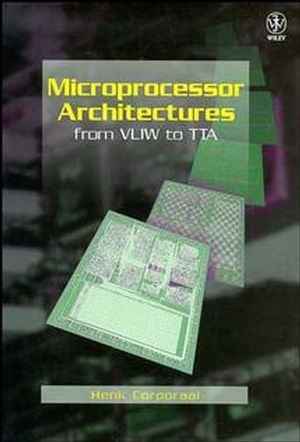Microprocessor Architectures: From VLIW to TTAISBN: 978-0-471-97157-3
Hardcover
428 pages
December 1997
 This is a Print-on-Demand title. It will be printed specifically to fill your order. Please allow an additional 10-15 days delivery time. The book is not returnable.
|
||||||
Exploring new trends in computer technology, Corporal introduces an
innovative and exciting concept: Transport Triggered Architecture
(TTAs). Unlike most traditional architectures, where programmed
operations trigger internal data transports, TTAs function through
programming the data transports themselves. As a result the new
architecture alleviates bottlenecks, allows for new code-generation
optimizations and exploits hardware more efficiently. Founded on
the author’s recent research, this book evaluates the
attributes of different classes of architectures. It demonstrates
how TTAs can be used as a template for automatic generation of
application-specific processors and highlights their suitability
for embedded system design. Several commercial TTA implementations
have proven its concepts and advantages.
Features includes:
- Complexity analysis of the data path of Instruction Level Parallel processors, particularly of VLIW (Very Long Instruction Word) and super-pipelined processors
- Derivation of the transport triggering concept illustrating processor simplification
- In-depth analysis of the architecture design space of TTAs and evaluation of architecture parameters
- Examination of the control and pipelining of instruction, function and register units
- Description of a trajectory for the automatic synthesis of TTAs for arbitrary applications written in a high-level language
- Detailed description of a prototype TTA processor enabling the reader to design an embedded computer system with excellent cost-performance ratio
Microprocessor Architectures is cutting-edge text which will prove invaluable to both industrial hardware and software engineers involved in embedded system design and to postgraduate electrical engineering and computer science students. This clearly-structured reference demonstrates the versatility of TTAs and explores their influential role in the next generation of computer architecture.



